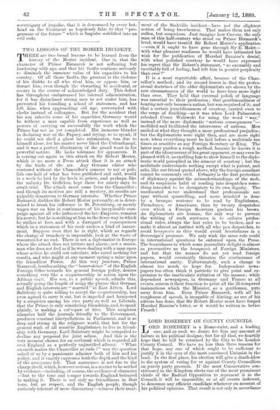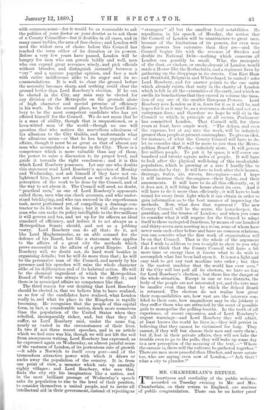LORD ROSEBERY ON COUNTY COUNCILS.
LORD ROSEBERY is a Home-ruler, and a leading one, and as such we desire for him any amount of failure in his political designs ; but for all that, we heartily hope that he will be returned by the City to the London County Council. We have no less than three reasons for that hope, any one of which ought to be sufficient to justify it in the eyes of the most convinced Unionist in the land. In the first place, his election wilL give a death-blow to the system of votieg for or against County Councillors on purely party grounds. If the most Conservative con- stituency in the Kingdom elects one of the most prominent chiefs of the Radical Opposition to represent it in the Council, it will be impossible, or at all events indecent, to denounce any efficient candidate whatever on account of his political opinions. That result is not only in accordance with common-sense—for it would be as reasonable to ask the politics of your doctor or your dentist as to ask those of a County Councillor—but it doubles in all cases, and in many cases trebles, the area of free choice ; and London will need the widest area of choice before this Council has reached the term either of its duration or its powers. Before a very few years have passed, London will be hungry for men who can govern boldly and well, men who can expend great revenues wisely, and pick officials without blunder, and distinguish instantly between a " cry " and. a mature popular opinion, and face a mob with entire indifference alike to its anger and its re- commendations. It is well to clear the ground before the necessity becomes sharp, and nothing could clear the ground better than Lord Rosebery's election. If he can be elected in the City, any man may be elected for any division of the Metropolis on the grounds alone of high character and special promise of efficiency in his work. In the second place, we believe Lord Rose- bery to be the most competent candidate who has yet offered himself for the Council. We do not mean that he is a man of ability, though that is unquestioned, or a keen-witted man of the world—though no one will question that who notices the marvellous adroitness of his allusions to the City Guilds, and understands what the allusions mean—or that he has large experience of affairs, though it must be as great as that of almost any man who accumulates a fortune in the City. There is a competence which is more valuable than any of these, the power to raise a discussion to its proper level, and guide it towards the right conclusion ; and it is this which Lord Rosebery possesses. Let any one who doubts this statement read Lord Rosebery's speeches of Monday and Wednesday, and ask himself if they have not en- lightened him, have not cleared as well as elevated his perception of the work to be done by the Council, and of the way to set about it. The Council will need, no doubt, "practical men," as one of Lord Rosebery's opponents called them, men who can check accounts, and who under- stand bricklaying, and who can succeed in the superhuman task, never performed yet, of compelling a drainage con- tractor to do his work in time ; but it will also require a man who can make its policy intelligible to the five millions it will govern and tax, and set up for its officers an ideal standard of efficiency, and induce it to act always as a Metropolitan Senate should, and not as a jobbing vestry. Lord Rosebery can do all that ; do it, not like Lord Magheramorne, as an able counsel for the defence of his Board, but like a statesman who applies to the affairs of a great city the methods which prove successful in the affairs of a great Empire. Lord Rosebery will, we doubt not, do hard work besides in organising details ; but he will do more than that; he will be the persuasive man of the Council, and merely by his presence and his speeches will raise the whole character alike of its deliberation and of its habitual action. He will be the chemical ingredient of which the Metropolitan Board of Works was always in want to clarify it ; and there is in municipal affairs no competence like that.
The third reason for our desiring that Lord Rosebery should be elected is, that we believe him to have realised, as so few of the candidates have realised, what London really is, and what its place in the Kingdom is rapidly becoming. He recognises that the people of this capital form, in fact, a considerable nation, much more numerous than the population of the United States when they rebelled, incomparably richer, and, but that they all suffer, as Lord Rosebery said, under the same fog, nearly as varied in the circumstances of their lives. In two if not three recent speeches, and in an article which we feel sure was his, though we will not lift the veil from anonymous writing, Lord Rosebery has expressed, as he expressed again on Wednesday, an almost painful sense of the vastness of London, of its portentous rate of growth —it adds a Norwich to itself every year—and of the tremendous attractive power with which it di.:aws or sucks away the population of the country. It is, from one point of view, a monster which eats up annually eighty villages ; and Lord Rosebery, who sees this, finds the city stir his imagination like a nation, and in the most brilliant passage of Wednesday's speech asks its population to rise to the level of their position, to consider themselves a united people, and to invite all intellectual aid in their government, instead of rejecting as " strangers " all but the smallest local notabilities. He repudiates, in his speech of Monday, the notion that the Council of London will be unattractive to great men, because of the limitations of its powers, for even were those powers less extensive than they are—and the Council begins life with the revenue of Sweden and double its National Debt—nothing which concerns all London can possibly be small. Why, the monopoly of the dust, or cinders, or smoke-deposit of London would made a House like the Rothschilds, and a regiment lives by gathering up the droppings in its streets. Can East Ham and Stratford, Belgravia and Whitechapel, be united ? asks Lord Rosebery, and for answer points to the one unity which already exists, that unity in the charity of London which is felt in all the extremities of the earth, and which so swells its benefactions that they exceed in volume the taxa- tion of any one of the smaller European Powers. Lord Rosebery sees London as it is, fears for it as it will be, and hopes for it as it may be, as a statesman should, and not as a vestryman does ; and therefore we hope he will sit in the Council to which, in principle at all events, Parliament has committed London. That Council will, for three years at least, have ample work. "The delays, and even the expense, but at any rate the work, will be infinitely greater than people at present contemplate. To give an idea, for instance, of what the County Council will have to do, let us consider that it will be more to you than the Metro- politan Board of Works,—infinitely more. It will govern five million people. To put it by space, it will cover one hundred and twenty square miles of people. It will have to look after the physical well-being of this incalculable population, which is growing at a rate I hardly like to estimate day by day. It will have to look after their houses, drainage, water, air, streets, fire-engines—and I hope it will increase their fire-engines—their lights, and their amusements. It will have to do all this efficiently, or, if it does not, it will bring the house about its ears. And it will have to do it more than efficiently ; it will have to look round for every fresh light which it can obtain in order to gain information as to the best manner of improving the methods. Now, what does that represent ? The new County Council will be the nurse, the housekeeper, the guardian, and the trustee of London ; and when you come to consider what it will require for the Council to adapt itself to these variegated functions, by means of one hundred and thirty-seven men meeting in a room, some of whom have never seen each other before and have no common relations, you can conceive what the first work of organisation will be on that Council. That is the whole of the argument that I wish to address to you to-night to show to you why I do not think that the County Council will have a bit more time or energy than it knows what to do with to accomplish what has been laid upon it. It is not a light and easy task to get any vast machine into order ; but this is the vastest machine that the world has ever seen." If the City will but poll all its electors, we have no fear for Lord Rosebery's election ; but there lies the danger of the whole situation. Except in one or two districts, the body of the people are not interested yet, and the vote may be smaller even than that by which the School Board is returned. The electors do not realise how great their responsibilities are, how vast are the interests con- fided to their care, how magnificent may be the jobbery if they suffer those who are attracted by the scent of possible gain to monopolise the polling-booths. In the teeth of all experience, of recent exposures, and of Lord Rosebery's urgent warnings—and Lord Rosebery they will admit, at least knows the world he lives in—they will persist in believing that they cannot be victimised for long. They cannot, if they will but choose their men and carry them ; but if, lost in their private affairs, they will not take the trouble even to go to the polls, they will wake up some day to a new perception of the meaning of the text,—" Where the carcase is-, there will the vultures be gathered together."
There are men more peaceful than Blucher, and more astute too, who are saying even now of London,—" Ach Gott ! what a city to plunder !"







































 Previous page
Previous page